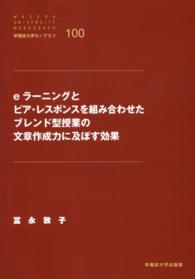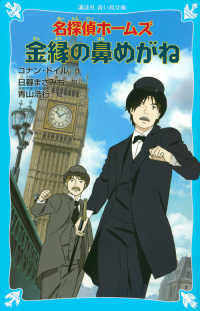- ホーム
- > 洋書
- > 英文書
- > Literary Criticism
Full Description
This unique anthology presents the important historical essays on tragedy, ranging from antiquity to the present, divided into historical periods and arranged chronologically. Across its span, it traces the development of theories and philosophies of tragedy, enabling readers to consider the ways in which different varieties of environmentalist, feminist, leftist and postcolonial thought have transformed the status of tragedy, and the idea of the tragic, for recent generations of artists, critics and thinkers. Students of literature and theatre will find this collection an invaluable and accessible guide to writing from Plato and Aristotle through to Freud, Nietzsche, Schopenhauer and 21st century theorists.
Ideas of tragedy and the tragic have been central to the understanding of culture for the past two millennia. Writers and thinkers from Plato through to Martha Nussbaum have analyzed the genre of tragedy to probe the most fundamental of questions about ethics, pleasure and responsibility in the world. Does tragedy demand that we enjoy witnessing the pain of others? Does it suggest that suffering is inevitable? Is human sexuality tragic? Is tragedy even possible in a world of rolling news on a digitally connected planet, where atrocity and trauma from around the globe are matters of daily information? In order to illustrate the different ways that writers have approached the answers to such questions, this Reader collects together a comprehensive selection of canonical writings on tragedy from antiquity to the present day arranged in six sections, each featuring an introduction providing concise and informed historical and theoretical frameworks for the texts.
Contents
Acknowledgements
Notes on the Texts
General Introduction
Chapter One: Antiquity and the Middle Ages
Introduction
1.1. Plato, The Republic
1.2. Aristotle, On The Art Of Poetry
1.3. Horace, The Art of Poetry
1.4. Longinus, On the Sublime
1.5. Evanthius, "On Drama"
1.6. Augustine, "On Stage-plays"
Chapter Two: The Early Modern Period
Introduction
2.1. Giovan Battista Giraldi Cinthio, Discourse or Letter on the Composition of Comedies and Tragedies
2.2. Lodovico Castelvetro, The Poetics of Aristotle
2.3. Stephen Gosson, Plays Confuted in Five Actions
2.4. Philip Sidney, Defense of Poetry
2.5. Thomas Heywood, The Apology for Actors
2.6. Pierre Corneille, from Three Discourses on Dramatic Poetry
2.7. John Milton, "Of That Sort of Dramatic Poem Which is Called Tragedy"
2.8. René Rapin, Reflections on Aristotle's Treatise of Poesie
2.9. John Dryden, "The Grounds of Criticism in Tragedy"
Chapter Three: The Eighteenth Century
Introduction
3.1. Joseph Addison and Richard Steele, The Spectator
3.2. George Lillo, "The Dedication" and "Prologue" to The London Merchant
3.3. David Hume, "Of Tragedy"
3.4. Edmund Burke, "Sympathy," "Of the Effects of Tragedy" and "The Sublime"
3.5. Jean-Jacques Rousseau, Letter to M. D'Alembert On the Theatre
3.6. Samuel Johnson, "Preface to Shakespeare"
3.7. Voltaire, "Letter XVIII. On Tragedy"
3.8. Elizabeth Montagu, An Essay on the Writings and Genius of Shakespear
3.9 Joanna Baillie, "Introductory Discourse"
Chapter Four: The Nineteenth Century
Introduction
4.1. August Wilhelm Schlegel, A Course of Lectures on Dramatic Art and Literature
4.2. Charles Lamb, "On the Tragedies of Shakespeare Considered with Reference for Their Fitness for Stage Representation"
4.3. William Hazlitt, Characters of Shakespeare's Plays
4.4. Percy Bysshe Shelley, A Defence of Poetry
4.5. Arthur Schopenhauer, The World as Will and Representation
4.6. G.W.F. Hegel, Aesthetics: Lectures on Fine Art
4.7. George Eliot, "The Antigone and its Moral"
4.8. Friedrich Nietzsche, The Birth of Tragedy
Chapter Five: 1900 to 1968
Introduction
5.1. Sigmund Freud, from The Interpretation of Dreams
5.2. A.C. Bradley, Shakespearean Tragedy
5.3. William Butler Yeats, "The Tragic Theatre"
5.4. Virginia Woolf, "On Not Knowing Greek"
5.5. Bertolt Brecht, "A Short Organum for the Theatre"
5.6. Robert Warshow, "The Gangster as Tragic Hero"
5.7. George Steiner, Death of Tragedy
5.8. Raymond Williams, "Tragedy and Revolution"
5.9. Athol Fugard, "On A View from the Bridge"
Chapter Six: Post-1968
Introduction
6.1 Augusto Boal, from The Theatre of the Oppressed
6.2. René Girard, "The Sacrificial Crisis"
6.3. Joseph Meeker, "Literary Tragedy and Ecological Catastrophe"
6.4. Catherine Belsey, The Subject of Tragedy
6.5. Biodun Jeyifo, "Tragedy, History and Ideology"
6.6. Nicole Loraux, The Rope and the Sword
6.7. Hélène Cixous, "Enter the Theatre (in between)"
6.8. Judith Butler, "Promiscuous Obedience"
6.9. Martha Nussbaum, "The 'Morality of Pity'"
6.10. David Scott, Conscripts of Modernity
Permissions Acknowledgements
Supplementary Reading
Index








